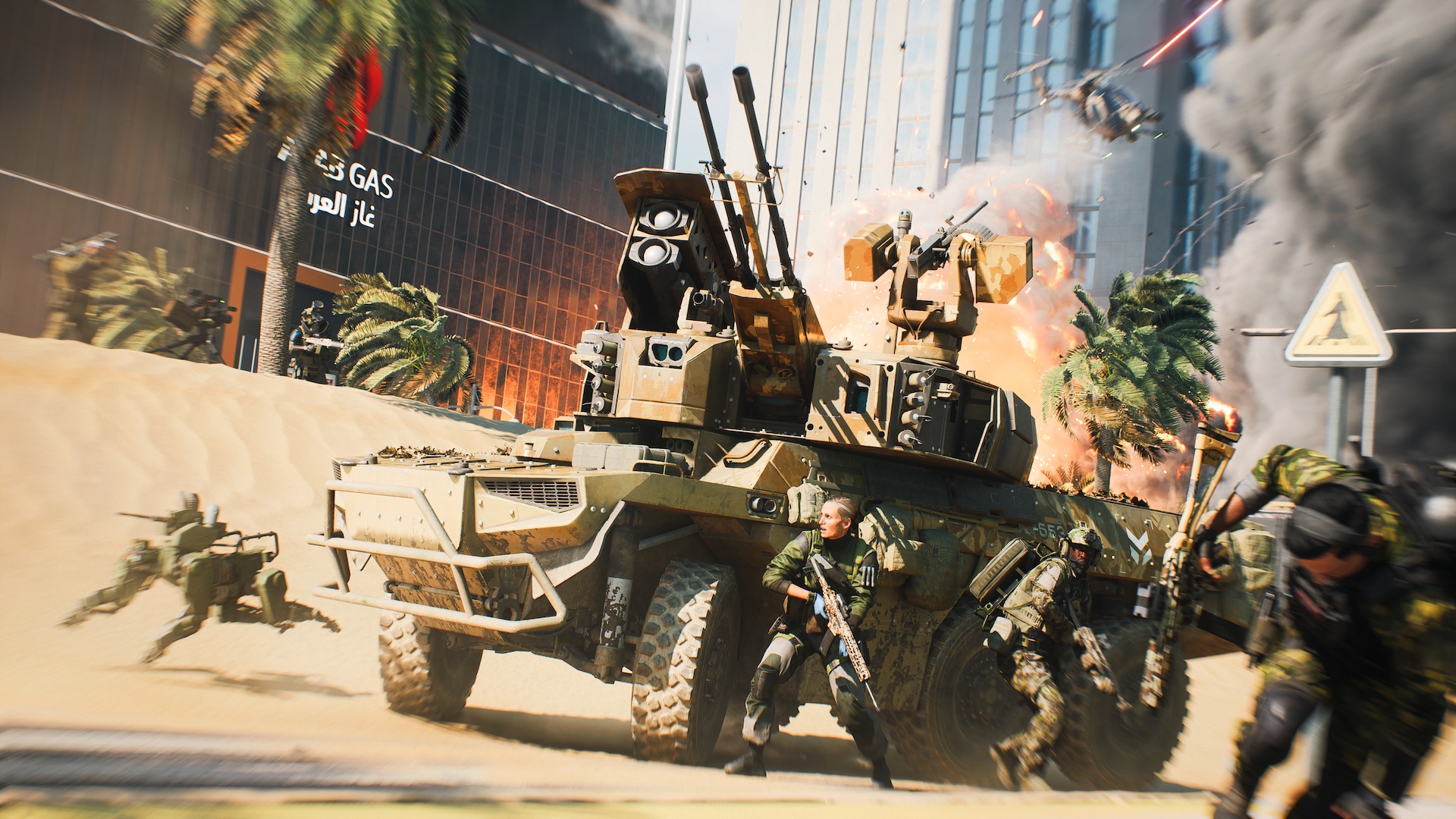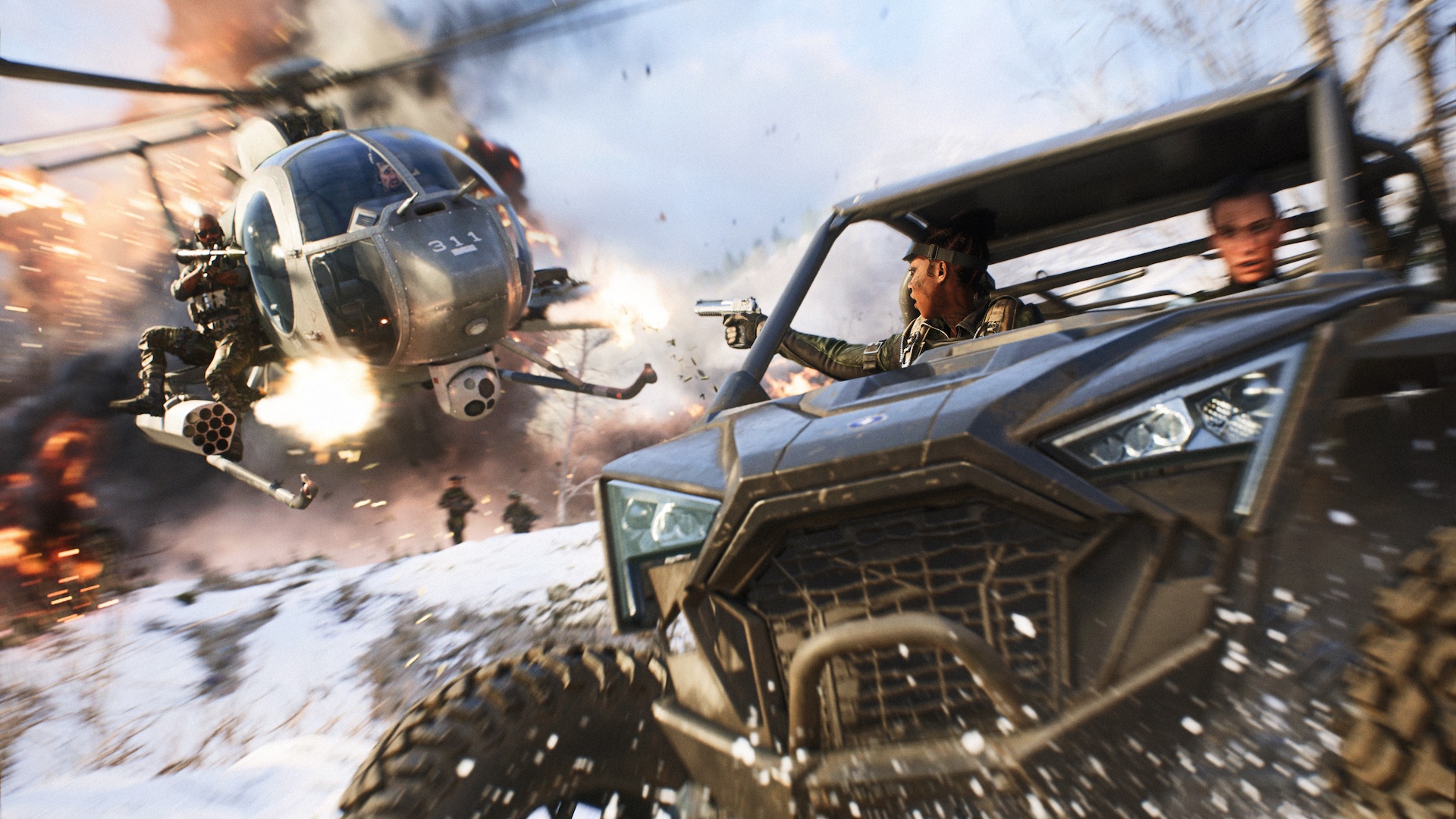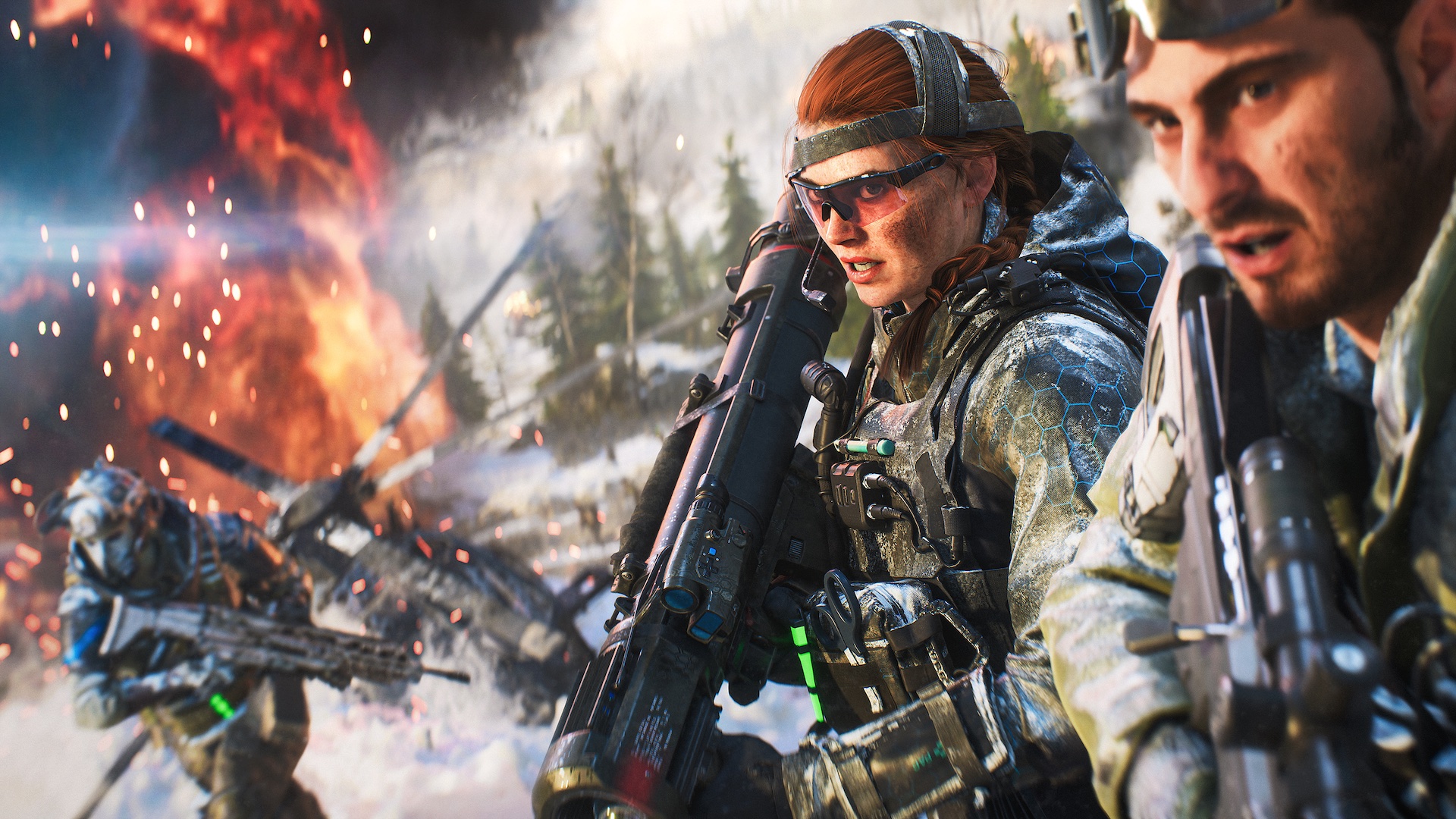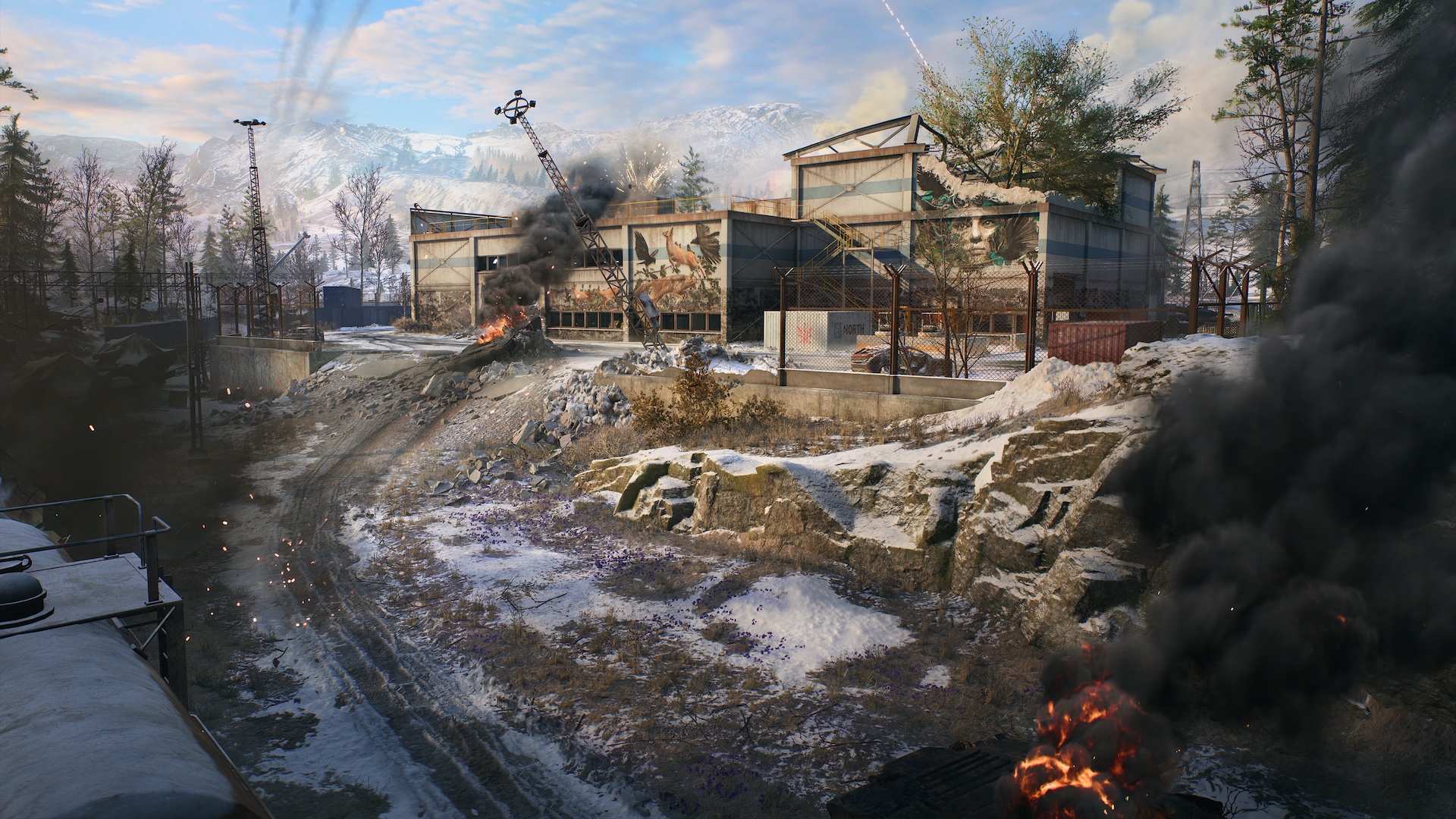
DICE is taking a victory lap. In November 2021, the tumultuous launch of Battlefield 2042 threatened to sink EA's flagship shooter franchise for good. There were complaints ranging from the strength of the featureset to the stability of the servers and, while we've witnessed some incredible comeback stories in recent years, the pressure on DICE to deliver was looking insurmountable. What a difference 18 months can make.
In my Battlefield 2042 review, I noted that there was a "strong foundation for future expansion", but I didn't expect it to look anything like this. To be fair, neither did senior producer Ryan McArthur. "Players were expecting a great game from us and we didn't deliver on that initially… it's been tiring, exhausting, and super rewarding." McArthur is quick to highlight the successes – new weapons and specialists, sweeping reworks to all seven of the launch maps, the return of class and squad management systems, and a steady influx of players deploying for renergized all-out-warfare.
But he also isn't afraid to reflect on where DICE fell short, and the steps the studio has taken to build stronger lines of communication with the Battlefield community. That's what McArthur and I explore here; we run through the reaction to the launch, how the studio translated criticism into action, the power of the class system, and more. But before we get to that conversation, we should consider the framing of Battlefield 2042 Season 5, which arrived on June 7, 2023.
The season is titled 'New Dawn' and that's somewhat appropriate. It's a direct reflection of how DICE views the journey it has undertaken. 18 months spent regaining the trust of a disappointed playerbase in a competitive marketplace, steadily rebuilding momentum with key quality-of-life improvements and long-awaited additions. And now, the studio feels as if it's finally in a position to push Battlefield 2042 to the next level. With a new dawn comes a new day.
Warning signs

"Battlefield 2042 just didn't land the way we hoped it would," says McArthur, a senior producer who was brought on shortly after launch to help salvage the project. "The way we talked about the game and the way the trailers had presented it, I think players were expecting a great game from us and we didn't deliver on that initially. But the team was really passionate about fixing it, and getting players what they were expecting from a Battlefield game."
McArthur says that the first six months were a particular struggle, as the studio attempted to process all of the criticism that came its way. "We did a lot of soul searching right after 2042 came out. I'm a big believer in the idea that how you make something is reflected in what you make. So when we started looking at how we wanted to fix this game, we took a really hard look not only at the game itself but how we made it. We had gotten away from making it with our players – that had gotten lost in the pressure to get the game out."
The Battlefield community is a passionate group – players and members of the development team alike. The first part of the process to fix 2042 was "taking the really difficult step of opening ourselves up in a vulnerable situation to take feedback," says McArthur. "Initially, it was harsh. What was coming back was tough to hear. Players were unhappy, but we knew that the disappointment came from a good place – they love this franchise. So a lot of this process was saying to the team, 'let's take the harsh feedback, let's see where they're at, and really understand what we missed.'"
From there, McArthur says it was key to rally the passion and expertise of the team around a central vision. "What we really drove after with a lot of this thinking was: let's be really clear on what game we want to make, what's missing, and what isn't working – we spent a good chunk of time figuring that all out, and getting the team aligned around it. They had to believe in it. We have a passionate team who wants to make a really good Battlefield game, so we really leaned into their expertise and allowed them a little bit of freedom to push after what they thought was missing."
Steady refinement

What followed was a slow but steady process of refinement. At the time, DICE's decision to delay the launch of Season 1 in early 2022 was viewed widely as the ringing of a death knell by EA. But internally the team knew it had to weather the storm for just a little longer. The gamble paid off. "When we launched the first season of the game, you could start to see pockets of momentum shift among the players. Season 2 was better, and the game was starting to find its feet. And then with Season 3 we saw a huge influx of new players," says McArthur.
Season 3 launched in November 2022 and brought with it the return of the class system, something which McArthur calls "the last big ticket item that we really wanted to have to get us to the game that we really wanted." Season 3 also aligned with Battlefield 2042's release into Xbox Game Pass Ultimate. The senior producer tells me that this was a huge milestone.
"I'm a big believer in programs like Game Pass, and for us it was a huge moment – something we marked on the calendar. One thing we talked about internally quite a lot was that if there was a moment in time where we were going to open this game up to a whole bunch of new players then it needs to be good. It needs to be the game that we wanted it to be when we launched it, and that really galvanized the team as we charged towards that date."
From there, McArthur says that each season has seen the player base expand. And with it, the team's enthusiasm. "With each of these new releases for players, the team got more and more excited – it really helped get their creative juices going," he continues. "I think that's why every Season has been better than the last. Look at not just the core work, but the weapons that we made, the fact that we reworked every single map that we shipped in this game at launch (with the last one coming out at the end of Season 5) – that's something we've never done before."
"I think our willingness to listen, to make changes, and to learn that if we didn't get something right the first time then let's get it right the second time, has sort of rejuvenated the player base. And it also rejuvenated the team by allowing them to go back and do the job that they thought they could have done better," says McArthur. "So while it was hard, it was also really fun for us. When I look back on my career, it's probably the journey that I'm most proud of."
Player feedback

Looking beyond a challenging launch window, a key component of DICE's strategy has been community outreach. You don't need to spend long on social media to find members of the studio's community management team interacting with players directly – working to identify points of friction and bring clarity to big changes. McArthur is quick to praise what this team has accomplished over the last 18 months. "They have a really good understanding of where we want to go, but also what the player's needs are. They have always been willing to wade into some pretty passionate conversations, and deal with some emotional reactions when we do something that doesn't go as planned."
"Our community management team has been able to do this in a really professional and empathetic way, and that really helps us better understand situations so that they can be escalated. Really strong community management has been so key to the success that we've had over the last 18 months," says McArthur, who notes that the Battlefield community will continue to be key players in 2042's ongoing evolution as a live service.
"Players always know what they want, they're just not necessarily the best at explaining it"
Ryan McArthur, senior producer
There's never any excuse for harassment or vitriol aimed at any member of a development team, and AcArthur says that an important part of this journey has been finding ways to filter feedback – he knows that much of it comes from a good place, and the challenge has been in how it incorporates information into its workflows. "Players always know what they want, they're just not necessarily the best at explaining it. If you take that mindset into all of these things, our job as developers is to find out what they mean. We can't say they're wrong – we have to understand that there's something in there that's causing somebody to react or ask for whatever they're asking for."
"We accept that as part of our job and we listen to it and try to find a path forward," he says. "And I think the team has really embraced that. It allows us to focus on where we are and where there are issues… and we're always looking for ways to refine and fine-tune aspects of the game. There's a willingness to move and change and adapt and work." We've already seen how this looks in practice – maps have been heavily reworked, there's been a dampening of 128-player battles, balance changes to weapons and vehicles, and entire systems have been overhauled. DICE still believes in Battlefield 2042, and it's willing to do whatever it takes to get the game to where it needs – and players want – it to be.
Classes return

DICE didn't waste any time in making sweeping changes to Battlefield 2042. It took just six months for the studio to cease development of Hazard Zone, the smaller-scale survival mode which failed to make an impact at launch, in an effort to refocus its resources on improving the core experience. One of the biggest results of this shift was the introduction of classes in Season 3, a series staple which defines roles across battlefields that are swarming with hundreds of players.
The most controversial 2042 design decision saw classes eschewed for a broader assignment of Specialists. 10 were available at launch, and while each loosely fit within Assault, Engineer, Support, and Recon boundaries, their wider proficiencies muddied the readability of squads. McArthur says the intention was good, but it just didn't land as intended. "The goal that we originally had was a good one to chase. We wanted to keep that 'rock, paper, scissors' teamplay structure and give it more identity, and provide more opportunities to grow the sandbox over time. What we underestimated was that, because it looks so different, players didn't necessarily see how it all fit together."
"Each of these Specialists were originally designed to fit within the class structure that we had in previous games. We just didn't land that communication, or execute it in a way that players understood what role each Specialist was supposed to play," says McArthur. "We underestimated the need to make sure that we constantly tie these things back to the original pillars of Battlefield – class gameplay, squadplay, and teamwork. This is one of the big places where we fell."

"A lot of our issues came from the fact that players didn't understand how the Specialists were supposed to work
Ryan McArthur, senior producer
"When we look back at the data, and when we really started moving forward with introducing the class systems, one of the big things we really started to understand was that a lot of our issues came from the fact that players didn't understand how the Specialists were supposed to work. And if you don't understand how something is supposed to work, of course you believe that the old way was better. Feedback from players was really good around this. So we had to find a way to give them what they wanted, but still allow us the freedom and flexibility that we originally wanted too."
The Specialists are now more distinctly divided into four Classes, and the result is a more cleanly defined structure to 2042's massive conflicts. Regardless of whether there are 64 or 128-players on a round of Conquest or Breakthrough, the pace to play is more balanced when players understand their role, and what is expected of them, to help the wider team succeed amidst the chaos. "From a perception perspective," McArthur says, "classes were the last nail in the journey back to what a Battlefield game should be, and we're seeing the community talk about how they've got the game they were hoping for when we first launched Battlefield 2042."
The return of classes has also been positive for DICE. McArthur says the system's return has given the team a "clarity of purpose" and has helped solidify the vision, driving development of new modes, maps, and themed-events forward. "Other features in the game are richer when you have a proper class system back in the game," he says, adding, "we're really leveraging players playing together, and accentuating that as we go forward."
Looking ahead
"People trip and make mistakes. I think it's good for us to get a chance to come back and do what we think we can do best"
Ryan McArthur, senior producer
There's still a long road ahead for Battlefield 2042, but the game available today is in a good place. McArthur isn't able to discuss the particulars of Season 6, but he is able to give us insight into DICE's mindset moving forward. "Coming into Season 5, I think that was sort of our first big step pushing forward into new. There is a lot of nostalgia tied to Season 5; the new map, Reclaimed, being a nod to the Battlefield 4-era, and even the coloring and tone of the season is very much leaning back towards the roots of the franchise," he says. "But what we really want to do is find new ways to connect with players now that we've really gotten the game under us."
If you take a broad look at what has come in Season 5, you get a clear sense of where Battlefield 2042 is heading next. DICE is exploring ways to strengthen the foundations, a tighter focus on squad management and modes which emphasize squad collaboration, and then find new ways to leverage the scale of the platform. "That's where we're at right now; we're trying to really sink our teeth into what makes Battlefield great while trying to find new ways to deliver that to players. I think Season 6 is going to be one of those really interesting moments where people are going to go, 'well, I didn't expect that, but that's really Battlefield.' And I think that's the kind of thing we want to go after right now. How do we move forward and give our players more, but still Battlefield."
"People trip and make mistakes," says McArthur as our conversation draws to a close. "I think it's good for us to get a chance to come back and do what we think we can do best. It's been fun to see players jump back in and give us another chance, and for them to say, 'yeah, you guys are getting where you're supposed to be."
As Battlefield 2042 continues to improve, it's fighting its way back into contention to land on our ranking of the best FPS games and best online games that you can play today.







